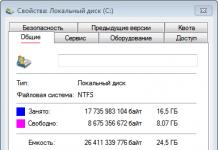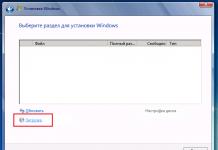Hello dear readers of my blog. Today I present to you an article about two archivers winzip and winrar. We will find out how they are similar and how they differ. winzip and winrar.
If you have large files, but there is little space left on your computer's hard drive to store them, and it's a pity to throw them away, then you can use the help of special compressor programs. Through a special compression algorithm, the compressor reduces the file size, and you can safely continue to "litter" your computer. Often such programs for reducing the size of files are called “archivers”. Indeed, after compression, the file is not suitable for normal use, but is only suitable for convenient storage on a virtual drive shelf.
The most famous users of the Windows operating system are archivers. winzip and winrar. These compressors are among the oldest on the market, and have long and well proven themselves as reliable and trouble-free tools. Both programs are paid, with a trial period. However, in this case, the concept of “trial period” is so vague that in fact, you can use archivers for years completely free of charge. From time to time (and not very often), the program modestly reminds the user that, they say, it is not Free at all. After that, the user, annoyed, like an annoying fly, closes the pop-up reminder and continues to enjoy the freebie with a calm heart. As you can see, modesty adorns not only a person, but also some programs.
What is the difference between WinZip and WinRar?
Despite the outward similarity, there are still significant differences. First, the creator winrar is a Russian programmer Evgeny Roshal. So winrar more tailored to our users and is mainly popular in the former USSR. It is believed that WinRar has a higher degree of compression, but it works more slowly.

Archiver winzip is the work of the hands and brain of the Western scientist Phil Katz. Accordingly, it is more common to meet winzip in foreign countries. By speed winzip surpasses winrar, but inferior in terms of compression. We can say that this is where all the differences end.

Both programs support many interface languages, so there will be no problems using them. By the way, the question of speed and compression ratio is quite relative. Much depends on the file format and size. In some cases, notice a significant difference in the work of archivers winzip and winrar fail.
Why do we need archivers for modern computers with many gigabytes of hard drives?
Indeed, the use of an archiver on a desktop is in most cases inappropriate. You only lose quite a lot of time on the compression procedure, and there is enough space anyway. You will need compressed files to transfer files by email, over the Internet. If you try to send a 15 MB photo by email, you will have to wait many minutes for transmission. In this case, it is more convenient to compress the photo and send it as an archive.
In addition, modern email clients have built-in spam protection and antiviruses. If you try to email the program (the same winrar) with the .exe extension, the mail client or even the server will not let such a file pass because it is suspicious. To bypass the protection of the mail client, the exe file is compressed and sent as a respectable and harmless archive.
Hello blog site readers! Information located on a computer hard drive or any other storage medium can be stored in a more compact form.
All you need to do is reduce the file size. This process is called archiving. Accordingly, the process of extracting from an archive is called unzipping.
Why do I need to back up data on a computer
Archiving allows you to increase free disk space and simplifies the transfer of information over the Internet, and for those who do not have unlimited access to the network, it also saves traffic.
In addition, when unpacking, the structure of the files is not violated, and the unzipping algorithm itself is simple and takes seconds (depending on the size of the archive).

Also, the necessary information can be accidentally deleted, destroyed by a virus, the possibility of a computer breakdown and many other reasons is not ruled out. It is important to foresee all the options, and if the information is archived, then it will not disappear anywhere.
You can restore everything from the archive, with rare exceptions:
- the archive was protected by a password that the user himself forgot;
- the user does not remember the location of the file;
- the archive was not created at all;
- the file was written to an external media that is currently corrupted and unreadable.
Unfortunately, the last point is quite common, because anything can fail, so it is recommended to copy all important information to several places.
As the saying goes, don't put all your eggs in one basket.
How to unzip files using Windows
The Windows 7, 8 or 10 operating system has its own unpacker for archives with the “.Zip” extension.
It has a limited range of capabilities, more precisely, it can only create and unpack zip archives. You will not be able to set a password, select the compression level, etc.

In order to use it, you need to right-click on the desired zip extension archive. In the menu that appears, select "Extract all ...", specify a location to save this file.

At the same time, if there is a checkmark next to “Show extracted files”, then after unzipping, a window with a new folder will appear.
Ways to unzip using archivers
An archiver is a program that reduces the size of data by compressing it without losing the information contained in it. These programs allow not only to archive, but also to unpack archives.

To date, there are many, both paid and free archivers, which do not differ from each other in the quality of work, but only in functionality.
Those programs that archive quickly have a low compression ratio. Conversely, archiving for a long time compresses information more thoroughly.
7-Zip
One of the most popular utilities is 7-Zip. This is a free and easy-to-understand program that allows you to unpack folders with the extension rar, 7z, zip and others.
The software can be downloaded from the website at 7-zip.org

To unpack, we find the desired document, right-click it, select it, from the submenu that appears, select the appropriate item: "Unpack", "Unpack here" or "Unpack to ...".

If you select the second or third option, no further action is required. If you choose the first option, you will need to specify the path to save the content. If you select "No paths", then everything will be saved in one place, without subfolders.
7-Zip offers another easy way to extract data. You can double-click the left mouse button on the archive to open it in the window of this program. Then select the desired files and click "Extract".
WinRAR
To unzip archives with the .rar extension, you can use the WinRAR program. It is better to use the software from the official site win-rar.com.

Its principle of operation is the same as that of 7-Zip.
It offers three options when unpacking: "Extract files ...", "Extract to the current folder" or "Extract to ..." ("Extract files", "Extract here", "Extract to ...", if you still installed the version in English).

When you select the first item "Extract files ..." a separate window appears for specifying the save path and extraction options.

You will need to check the boxes next to the appropriate items:
Update mode: (update mode):
- extract with file replacement (recommended) (Extract and replace files);
- extract with update (Extract and update);
- update only existing ... (Fresh existing files only...)
Mode overwriting: (Overwrite mode):
- issue a request when overwriting (recommended) (Ask before Overwrite);
- overwrite without prompt (Overwrite without prompt);
- skip existing files (Skip existing files);
- rename automatically (Rename automatically).
What is a multi-volume archive and how to extract it
It is a little more difficult to unpack a multi-volume archive, because it is an archive that contains several parts. Modern archivers allow you to transfer it not entirely, but by individual components.
If a volume is damaged, you will need to re-download only it, and not all parts. In addition, WinRAR, for example, provides for the recovery of missing volumes.
The user can independently adjust the size of the volumes, suitable for different drives, for example, a flash card or a CD.
A number is added to the extension of each such file in order, for example, File.z01, File.z02, and so on, or File.part01, File.part02.
To unpack all parts, it is enough to unzip the first one, all the others will start doing it themselves in turn.

Let's imagine that the user has downloaded a movie packed into several parts. To unzip them, you need to right-click only on the first part and extract using WinRAR or 7-Zip to the current folder or a new one.
The peculiarity of the WinRAR program is that it can unzip an archive created with its help, it gives an error on others.
Similarly, other programs cannot unpack files with the .rar extension.
In any case, unpacking the data is a simple task that usually takes seconds.
Greetings!
Files of these types of archives are ubiquitous on the Internet. What is the difference between them, is rar or zip better, and why couldn't it be just one format?
To answer this question, we must turn to history.
The ZIP format dates back to 1989. It was then that this compression format was announced, and the first version of the archiver program appeared.
Just don't think that no other compression formats existed before, it's just that the ZIP format was quite "mature", and its developer was eventually able to achieve widespread support from popular operating systems of the time.
This ultimately played a key role in ZIP's popularity, and resulted in a significant lead over the competition.
However, as time went on, the semiconductor industry developed, computing power grew. And if earlier computers were used exclusively for calculations and were a niche product, then over time they became capable of performing multimedia functions.
Naturally, all this spurred the demand for computers on which it became possible to play games, access the Internet, and so on. Against the background of the growing PC market, applications began to appear, among which was WinRAR.
In 1995, the first version of WinRAR for Windows appeared. Already at that time, the developer, who, by the way, is our compatriot, introduced support for features that ZIP did not have: multi-volume support (splitting archives into several parts), the ability to add information to restore a damaged archive, etc.
To this day, WInRAR and its RAR compression standard are developing quite dynamically, the algorithm and the speed of compressing / decompressing archives, etc. are improving.
All this is highly appreciated by users, thanks to which this archiver takes its place "under the sun".
So what is the difference between RAR and ZIP today?
1) Compression in ZIP format is slightly faster, however, the size of the final archive is slightly larger when compared to RAR.
2) RAR has the ability to create a "Permanent Archive", which achieves even greater compression, ZIP does not have this capability.
3) ZIP never learned how to create a multi-volume (an archive split into several files of equal size) archive type, while RAR was able to do this from the very beginning.
4) Restoring a damaged ZIP archive is very difficult; in RAR, this possibility is provided from the very beginning in the algorithm.
5) To this day, any ZIP archiver / archive may have a problem with compressing / decompressing files larger than 2 gigabytes.
6) To unpack / create a RAR archive, you need to unpack / create a ZIP archive in a popular operating system in a regular way.
So we examined in detail the advantages and disadvantages of RAR and ZIP. Finally, I suggest you familiarize yourself with, which allow you to work with most types of archives, including ZIP and RAR.
If you have any questions, you can ask them in the comments.
The other day I was approached with the question, what type of archive best compresses files? I have already met tests comparing the effectiveness of various compression algorithms more than once. 7z almost always wins them. However, I decided not to give such an unambiguous answer. And here's why: the compression ratio is not the only criterion to determine the best type of archive.
The degree of file compression is affected by the program that is used to create the archive, and its settings, and features of the compressed file. In addition, I would not lose sight of the convenience of using the compression format and the degree of its integration into operating systems. If we compress a document to send it by email, we need to be sure that the recipient will be able to decompress it without any problems.
little test
And yet, reducing the file size is the main function of the archiver. Therefore, I decided to conduct my own comparison of algorithms. In serious tests, the work of archivers with files of different types is usually tested. And in the most advanced ones, they also look for optimal settings. I will do it easier: I will compress the folder with the installed game - after all, it contains different types of data: music, graphics, documentation, and executable files. I will not change the settings of the archiving programs - this is exactly what most users do.
So, the game Bastion - the size of the folder is 863 MB:
- Zip (integrated in Windows 8.1) - 746 MB (86.4% of the original volume);
- Zip (WinZip) - 745 MB (86.3%);
- RAR (WinRAR) - 746 MB (86.4%);
- 7z (7-Zip) - 734 MB (85%).
Hotline Miami game - folder size 654 MB:
- Zip (integrated in Windows 8.1) - 316 MB (48.3% of the original volume);
- Zip (WinZip) - 314 MB (48%);
- RAR (WinRAR) - 307 MB (46.9%);
- 7z (7-Zip) - 301 MB (46%).
Thus, the winner in the file compression competition, as I expected, was 7z. But is it worth choosing this particular format? I think not always.
Integration and distribution
After all, 7z didn't get that far ahead. Zip and RAR are literally breathing down his back. And which of these formats will "digest" your computer or the system of the user to whom you transfer the compressed file without any problems?
In terms of prevalence, Zip is in the lead. Tools for working with it are integrated into Windows and OS X. Most Linux distributions support Zip out of the box. Right after installation, we can compress and decompress files in Zip and RAR formats.
But what about 7z? To work with it, you need to download and install a separate application. Even if it is a free program, but is 1-2% of the file size worth this fuss? And if you transfer the archive to a person who is far from all this, then you will have to spend a lot of time explaining to him how to deal with the file.
Therefore, I recommend using 7z only when you really need to achieve maximum file compression. You can still practice with the archiver settings and reduce the file size even more (but this will result in a loss of time for compression and decompression, and also increase the risk of data loss).
In all other cases, we should choose Zip as the most common archive format. Let the file be compressed a little less tightly. But it can be created and opened by any user on any modern computer.
If you actively exchange information on the Internet, store “heavy” files, or like to send voluminous e-mails, it is unlikely that your life is complete without data archiving. The use of compression formats such as "7z", "rar", "tar", "zip" is so familiar that it has outgrown the usual need.
Many users use these formats out of inertia, even with large mailboxes and the ability to send gigabytes of information in one message. Of the two main programs on the archiver market - WinRAR or 7-Zip - which one better suits the user's needs? It is difficult for a beginner to give an answer, but the topic is interesting. And therefore requires deep consideration.
WinRAR: Classics of the genre
The file manager of the program can be easily "customized" for yourself - the appearance of icons and panels is configured, the output of document properties can be adjusted. WinRAR is a shareware program. Despite this, in the basic functionality, the user will find everything that may be needed for the first time.

So, the main advantages of WinRAR include:
- habit.
- Good support.
- Sufficient functionality.
- Good compression algorithm.
- Ease of setup.
ATTENTION. Despite this, WinRAR does not break records in terms of "power" compression. Most tests show that the program saves a minimum of volume compared to the original documents. It is this reason that not so long ago prompted many users to look for alternatives to the RAR format. One such alternative was 7-Zip.
7-Zip: A worthy opponent
At one time, 7-Zip was considered as a platform for a completely new archive format - "7z". As numerous tests have shown, it really offers an improved file packing algorithm. Especially - text documents and images. This is due to the structure of such files - they often contain repeating elements that can be packed not into a new block of information, but as a duplicate of an existing one. 7-Zip goes even further.

In addition, the program is very simple. Any user can easily cope with its setting. Support for popular formats including "RAR" is also included. You can add a few more of its advantages:
- 7-Zip is free software. It is absolutely free.
- Improved algorithm for working with native format.
- Constant updates.
- The necessary minimum for work (and even more).
- Saving computer resources and in general - faster work.
Summing up
In the 7Zip vs WinRAR race, it's hard to give preference to one program. Especially today, when compression is done more with the goal of organizing information. If you need a versatile and powerful program whose "native" format is supported on almost all computers - WinRAR will serve you well. If you are used to counting space on storage media and love minimalism, 7-Zip will undoubtedly appeal to you.
Do you want to discuss information about file managers? Or maybe offer your own, less popular, but more interesting? Share information in the comments to the article and read other materials of our site!



































